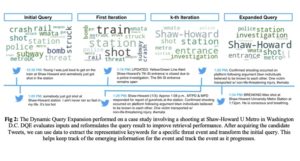DAC Student Spotlight: Omer Zulfiqar

Omer Zulfiqar, DAC master’s student in the Department of Computer Science.

Graphic is from the paper, “RIDE-SECURE: Metro Security Incidents And Threat Detection Using Social Media”
After graduating from Virginia Tech in December 2018 with a bachelor of science degree in electrical engineering and a minor in computer science, Omer Zulfiqar moved to northern Virginia to be closer to his family. He was also in close proximity to the university’s location in the greater Washington, D.C. area.g
In Fall 2019, he began pursuing a master’s degree in computer science and once again, chose Virginia Tech, this time at the Falls Church campus.
“Virginia Tech is a world renowned university in the field and at the Discovery Analytics Center I am able to work on interdisciplinary collaborations guided by incredible faculty, like my advisor Dr. Chang-Tien Lu, who are doing some amazing research work in the fields of artificial intelligence, machine learning, and data mining,” Zulfiqar said.
Zulfiqar’s interest in machine learning was sparked during his senior year when he took courses involving data analytics and artificial intelligence.
“I was working with natural language processing, doing small projects with chatbots and also touching the surface of deep learning,” he said. “The idea of how you can analyze tons of data, extract value and glean insight from it, and then use it to develop a model that could give you predicted results was always very intriguing to me. I didn’t just want to work on something that people would use, I wanted to develop something that could help people. Seeing the potential that it has to help tackle some of the world’s most challenging problems I decided to focus on machine learning.
With help from Lu, his first year of graduate work has afforded him an opportunity to explore a number of different research topics including detecting and monitoring events by analyzing social media data; detecting threats within rail-based transit systems; and developing knowledge graphs to analyze and monitor epidemics.
Zulfiqar collaborated with Lu and other DAC students on the Washington Metropolitan Area Transit Authority (WMATA) study, “RIDE-SECURE: Metro Security Incidents And Threat Detection Using Social Media,” which developed a model using data from Twitter to help identify and detect threats within a rail based public transit system, using convolutional neural networks and dynamic query expansion. In February, the team submitted the paper to a major conference and is awaiting approval.
He is projected to receive his master’s degree in Spring 2021 and is considering two options upon graduation: an industry position as a software or machine learning engineer or continuing his education in a Ph.D. program.
“If I decide to pursue a Ph.D., it would again be at Virginia Tech because I would definitely want to continue my research with Dr. Lu at DAC,” Zulfiqar said.